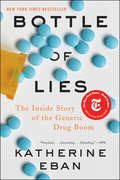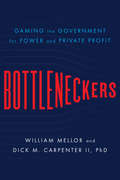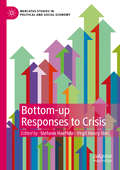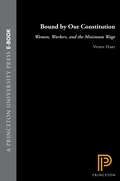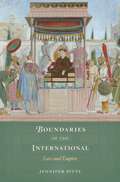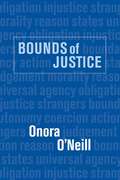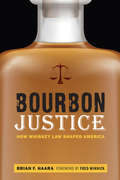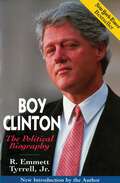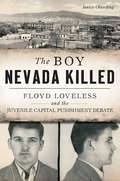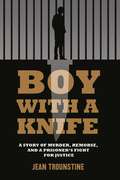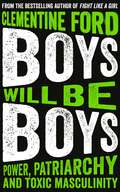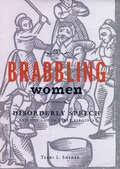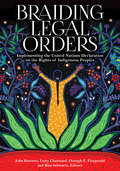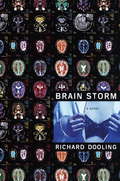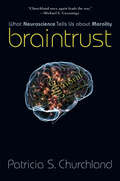- Table View
- List View
Bottle of Lies: The Inside Story of the Generic Drug Boom
by Katherine EbanA NEW YORK TIMES BESTSELLER New York Times 100 Notable Books of 2019New York Public Library Best Books of 2019 Kirkus Reviews Best Health and Science Books of 2019Science Friday Best Books of 2019 New postscript by the authorFrom an award-winning journalist, an explosive narrative investigation of the generic drug boom that reveals fraud and life-threatening dangers on a global scale—The Jungle for pharmaceuticalsMany have hailed the widespread use of generic drugs as one of the most important public-health developments of the twenty-first century. Today, almost 90 percent of our pharmaceutical market is comprised of generics, the majority of which are manufactured overseas. We have been reassured by our doctors, our pharmacists and our regulators that generic drugs are identical to their brand-name counterparts, just less expensive. But is this really true?Katherine Eban’s Bottle of Lies exposes the deceit behind generic-drug manufacturing—and the attendant risks for global health. Drawing on exclusive accounts from whistleblowers and regulators, as well as thousands of pages of confidential FDA documents, Eban reveals an industry where fraud is rampant, companies routinely falsify data, and executives circumvent almost every principle of safe manufacturing to minimize cost and maximize profit, confident in their ability to fool inspectors. Meanwhile, patients unwittingly consume medicine with unpredictable and dangerous effects.The story of generic drugs is truly global. It connects middle America to China, India, sub-Saharan Africa and Brazil, and represents the ultimate litmus test of globalization: what are the risks of moving drug manufacturing offshore, and are they worth the savings? A decade-long investigation with international sweep, high-stakes brinkmanship and big money at its core, Bottle of Lies reveals how the world’s greatest public-health innovation has become one of its most astonishing swindles.
Bottleneckers: Gaming the Government for Power and Private Profit
by Dick M. Carpenter II William MellorBottlenecker (n): a person who advocates for the creation or perpetuation of government regulation, particularly an occupational license, to restrict entry into his or her occupation, thereby accruing an economic advantage without providing a benefit to consumers.The Left, Right, and Center all hate them: powerful special interests that use government power for their own private benefit. In an era when the Left hates "fat cats" and the Right despises "crony capitalists," now there is an artful and memorable one-word pejorative they can both get behind: bottleneckers.A "bottlenecker" is anyone who uses government power to limit competition and thereby reap monopoly profits and other benefits. Bottleneckers work with politicians to constrict competition, entrepreneurial innovation, and opportunity. They thereby limit consumer choice; drive up consumer prices; and they support politicians who willingly overstep the constitutional limits of their powers to create, maintain, and expand these anticompetitive bottlenecks.The Institute for Justice's new book Bottleneckers coins a new word in the American lexicon, and provides a rich history and well-researched examples of bottleneckers in one occupation after another-from alcohol distributors to taxicab cartels-pointing the way to positive reforms.
Bottom-up Responses to Crisis (Mercatus Studies in Political and Social Economy)
by Virgil Henry Storr Stefanie HaeffeleCrises occur in all societies across world, and can be natural (such as hurricanes, flooding, and earthquakes), man-made (such as wars and economic downturns), or, often, a combination of both (such as famines, the flooding of New Orleans in 2005 after Hurricane Katrina and subsequent levy failures, and the earthquake, tsunami, and nuclear disaster in Japan in 2011). Crises cause fatalities, injuries, and property damages as well as introduce uncertainty and challenges for individuals, societies, and polities. Yet, we see individuals and communities rebounding effectively from crises all the time. How do communities go about returning to normalcy and beginning again the mundane life of every day affairs? This edited volume looks at bottom-up responses to crises. The chapters in this volume will highlight the ingenuity and persistence of individuals and private organizations as well as discuss the possibilities, limitations, and adaptability of bottom-up responses. It argues that there are many ways that local leaders, entrepreneurs, and community members can play a role in their own recovery by examining the capabilities, feedback mechanisms, and network effects of decentralized crisis response and recovery efforts. Chapters will focus on the role of local emergency managers in the disaster management process and offer suggestions for reform and the role of businesses, citizens, and children in providing crisis response and recovery. This book will also consider theories of self-governance and nonviolent action in encouraging and sustaining bottom-up recovery.
Bound By Honor
by Gary Smalley Greg SmalleyGary and Greg Smalley are psychologists as well as father and son. They share insights from their relationship as well as their experience with their clients. They teach parents how to create a loving, respectful, and nurturing relationship with teenagers. Topics include offering loving discipline, handling the family car, dating, and letting go as teens reach adulthood.
Bound by Our Constitution: Women, Workers, and the Minimum Wage (Princeton Studies in American Politics: Historical, International, and Comparative Perspectives #40)
by Vivien HartWhat difference does a written constitution make to public policy? How have women workers fared in a nation bound by constitutional principles, compared with those not covered by formal, written guarantees of fair procedure or equitable outcome? To investigate these questions, Vivien Hart traces the evolution of minimum wage policies in the United States and Britain from their common origins in women's politics around 1900 to their divergent outcomes in our day. She argues, contrary to common wisdom, that the advantage has been with the American constitutional system rather than the British.Basing her analysis on primary research, Hart reconstructs legal strategies and policy decisions that revolved around the recognition of women as workers and the public definition of gender roles. Contrasting seismic shifts and expansion in American minimum wage policy with indifference and eventual abolition in Britain, she challenges preconceptions about the constraints of American constitutionalism versus British flexibility. Though constitutional requirements did block and frustrate women's attempts to gain fair wages, they also, as Hart demonstrates, created a terrain in the United States for principled debate about women, work, and the state--and a momentum for public policy--unparalleled in Britain. Hart's book should be of interest to policy, labor, women's, and legal historians, to political scientists, and to students of gender issues, law, and social policy.
Boundaries and Allegiances: Problems of Justice and Responsibility in Liberal Thought
by Samuel SchefflerThis book is a collection of eleven essays by one of the most interesting moral philosophers. It examines challenges to liberal thought posed by the changing circumstances of the modern world such as the conflicting tendencies toward global integration, and greater ethnic and communal identification. The author considers whether liberal principles of justice can accommodate social and global interdependencies while reaffirming the importance of individual responsibility and acknowledging the significance of people's diverse personal and communal allegiances.
Boundaries and Secession in Africa and International Law
by Dirdeiry M. AhmedThis book challenges a central assumption of the international law of territory. The author argues that, contrary to the finding in the Frontier Dispute case, uti possidetis is not a general principle of law enjoining states to preserve pre-existing boundaries on state succession. It demonstrates that African state practice and opinio juris gave rise to customary rules that govern sovereign territory transfer in Africa. It explains that those rules changed international law as it relates to Africa in many respects, leading chiefly to creating norms of African jus cogens prohibiting secession and the redrawing of boundaries. The book examines in-depth the singularity of secession in Africa exploring extensive state practice and case law. Finally, it advances a daring argument for a right to egalitarian self-determination, addressing people-to-people domination in multi-ethnic African states, to serve as an exception to the fast special customary rule against secession.
Boundaries of Loyalty
by Berman Saul J.Talmudic legislation prescribed penalty for a Jew to testify in a non-Jewish court, against a fellow Jew, to benefit a gentile - for breach of a duty of loyalty to a fellow Jew. Through close textual analysis, Saul Berman explores how Jewish jurists responded when this virtue of loyalty conflicted with values such as Justice, avoidance of desecration of God's Name, deterrence of crime, defence of self, protection of Jewish community, and the duty to adhere to Law of the Land. Essential for scholars and graduate students in Talmud, Jewish law and comparative law, this key volume details the nature of these loyalties as values within the Jewish legal system, and how the resolution of these conflicts was handled. Berman additionally explores why this issue has intensified in contemporary times and how the related area of 'Mesirah' has wrongfully come to be prominently associated with this law regulating testimony.
Boundaries of the International: Law and Empire
by Jennifer PittsIt is commonly believed that international law originated in relations among European states that respected one another as free and equal. In fact, as Jennifer Pitts shows, international law was forged at least as much through Europeans’ domineering relations with non-European states and empires, leaving a legacy still visible in the unequal structures of today’s international order. Pitts focuses on the eighteenth and nineteenth centuries, the great age of imperial expansion, as European intellectuals and administrators worked to establish and justify laws to govern emerging relationships with non-Europeans. Relying on military and commercial dominance, European powers dictated their own terms on the basis of their own norms and interests. Despite claims that the law of nations was a universal system rooted in the values of equality and reciprocity, the laws that came to govern the world were parochial and deeply entangled in imperialism. Legal authorities, including Emer de Vattel, John Westlake, and Henry Wheaton, were key figures in these developments. But ordinary diplomats, colonial administrators, and journalists played their part too, as did some of the greatest political thinkers of the time, among them Montesquieu and John Stuart Mill. Against this growing consensus, however, dissident voices as prominent as Edmund Burke insisted that European states had extensive legal obligations abroad that ought not to be ignored. These critics, Pitts shows, provide valuable resources for scrutiny of the political, economic, and legal inequalities that continue to afflict global affairs.
Bounded Rationality and Economic Diplomacy
by Skovgaard Poulsen, Lauge N.Modern investment treaties give private arbitrators power to determine whether governments should pay compensation to foreign investors for a wide range of sovereign acts. In recent years, particularly developing countries have incurred significant liabilities from investment treaty arbitration, which begs the question why they signed the treaties in the first place. Through a comprehensive and timely analysis, this book shows that governments in developing countries typically overestimated the economic benefits of investment treaties and practically ignored their risks. Rooted in insights on bounded rationality from behavioural psychology and economics, the analysis highlights how policy-makers often relied on inferential shortcuts when assessing the implications of the treaties, which resulted in systematic deviations from fully rational behaviour. This not only sheds new light on one of the most controversial legal regimes underwriting economic globalization but also provides a novel theoretical account of the often irrational, yet predictable, nature of economic diplomacy.
Bounds Of Justice
by Onora O'NeillIn this collection of essays Onora O'Neill explores and argues for an account of justice that is fundamentally cosmopolitan rather than civic, yet takes serious account of institutions and boundaries, and of human diversity and vulnerability. Starting from conceptions that are central to any account of justice - those of reason, action, judgement, coercion, obligations and rights - she discusses whether and how culturally or politically specific concepts and views, which limit the claims and scope of justice, can be avoided. She then examines the demands and scope of just institutions, arguing that there are good reasons for taking the claims of distant strangers seriously, but that doing so points not to a world without boundaries but to one of porous boundaries and dispersed power. Bounds of Justice will be of interest to a wide range of readers in philosophy, politics and international relations.
Bourbon Justice: How Whiskey Law Shaped America
by Fred Minnick Brian F. HaaraBourbon whiskey has made a surprising contribution to American legal history. Tracking the history of bourbon and bourbon law illuminates the development of the United States as a nation, from conquering the wild frontier to rugged individualism to fostering the entrepreneurial spirit to solidifying itself as a nation of laws. Bourbon is responsible for the growth and maturation of many substantive areas of the law, such as trademark, breach of contract, fraud, governmental regulation and taxation, and consumer protection. In Bourbon Justice Brian Haara delves into the legal history behind one of America’s most treasured spirits to uncover a past fraught with lawsuits whose outcome, surprisingly perhaps, helped define a nation. Approaching the history of bourbon from a legal standpoint, Haara tells the history of America through the development of commercial laws that guided our nation from an often reckless laissez-faire mentality, through the growing pains of industrialization, and past the overcorrection of Prohibition. More than just true bourbon history, this is part of the American story.
Bourgeois Nightmares: Suburbia, 1870-1930
by Robert M. FogelsonThe quintessential American suburbs, with their gracious single-family homes, large green lawns, and leaf-shaded streets, reflected not only residents' dreams but nightmares, not only hopes but fears: fear of others, of racial minorities and lowincome groups, fear of themselves, fear of the market, and, above all, fear of change. These fears, and the restrictive covenants that embodied them, are the subject of Robert M. Fogelson's fascinating new book. As Fogelson reveals, suburban subdividers attempted to cope with the deep-seated fears of unwanted change, especially the encroachment of "undesirable" people and activities, by imposing a wide range of restrictions on the lots. These restrictions ranged from mandating minimum costs and architectural styles for the houses to forbidding the owners to sell or lease their property to any member of a host of racial, ethnic, and religious groups. These restrictions, many of which are still commonly employed, tell us as much about the complexities of American society today as about its complexities a century ago.
Bourne on Company Law
by Nicholas BourneAn ideal introductory textbook, Bourne on Company Law offers a succinct overview of the fundamental areas covered in LLB and GDL courses. The text is clear and easy to follow, being presented in short, sub-headed sections for ease of navigation, and is thoroughly cross-referenced to highlight connections across topics. Written for both law and non-law students, this text offers straightforward explanations of all key cases, as well as chapter summaries and end of chapter questions to aid understanding. The book is also supported by a companion website offering self-test questions, a useful glossary and annotated web links.
Boy Clinton: The Political Biography
by R. Emmett Tyrrell Jr.A New York Times Bestseller! Boy Clinton traces the formative influence of the hustlers and rogues who populated the hometown of the young, fatherless Bill Clinton all the way to the drug-trafficking, tax evading governor and lying, obstructing president he would one day become. Tyrrell's classic expose continues to offer a penetrating and often humorous glimpse into the checkered past of Bill and Hillary long before Monica, Benghazi, and the shady Clinton Foundation dominated the spotlight.
Boy Nevada Killed, The: Floyd Loveless and the Juvenile Capital Punishment Debate (True Crime)
by Janice OberdingAt seventeen, Floyd Burton Loveless became the youngest person ever executed by the state of Nevada. What led him to that end was just as tragic. Following a series of family catastrophes, Loveless was a petty thief by age twelve and a confessed rapist at fifteen. Sentenced to seven years at an Indiana state boys’ reformatory, he escaped after a month in custody. The ruthless teen robbed his way to Carlin, Nevada, where he shot and killed a constable who spotted the stolen car he was driving and confronted him. After a protracted legal battle, Loveless died in the gas chamber on September 29, 1944. Author Janice Oberding recounts the sordid details that sparked national controversy over the constitutionality of juvenile capital punishment.
Boy With A Knife
by Jean TrounstineNearly a quarter of a million youth are tried, sentenced, or imprisoned as adults every year across the United States. On any given day, ten thousand youth are detained or incarcerated in adult jails and prisons. Putting a human face to these sobering statistics, Boy With A Knife tells the story of Karter Kane Reed, who, at the age of sixteen, was sentenced to life in an adult prison for a murder he committed in 1993 in a high school classroom. Twenty years later, in 2013, he became one of the few men in Massachusetts to sue the Parole Board and win his freedom. The emotional and devastating narrative takes us step by step through Karter's crime, trial, punishment, and survival in prison, as well as his readjustment into regular society. In addition to being a powerful portrayal of one boy trying to come to terms with the consequences of his tragic actions, Boy With A Knife is also a searing critique of the practice of sentencing youth to adult prisons, providing a wake-up call on how we must change the laws in this country that allow children to be sentenced as adults.
Boys Will Be Boys: Power, Patriarchy and Toxic Masculinity
by Clementine FordThe incendiary new book about toxic masculinity and misogyny from Clementine Ford, author of the best-selling feminist manifesto, Fight Like A Girl. Fearless feminist heroine Clementine Ford&’s incendiary first book, Fight Like A Girl, is taking the world by storm, galvanising women to demand and fight for real equality and not merely the illusion of it. Now Boys Will Be Boys examines what needs to change for that equality to become a reality. It answers the question most asked of Clementine: 'How do I raise my son to respect women and give them equal space in the world? How do I make sure he's a supporter and not a perpetrator?' Ford demolishes the age-old assumption that superiority and aggression are natural realms for boys, and demonstrates how toxic masculinity creates a disturbingly limited and potentially dangerous idea of what it is to be a man. Crucially, Boys Will Be Boys reveals how the patriarchy we live in is as harmful to boys and men as it is to women and girls, and asks what we have to do to reverse that damage. The world needs to change and this book shows the way.
Brabbling Women
by Terri L. SnyderBrabbling Women takes its title from a 1662 law enacted by Virginia's burgesses, which was intended to offer relief to the "poore husbands" forced into defamation suits because their "brabling" wives had slandered or scandalized their neighbors. To quell such episodes of female misrule, lawmakers decreed that husbands could choose either to pay damages or to have their wives publicly ducked. But there was more at stake here. By examining women's use of language, Terri L. Snyder demonstrates how women resisted and challenged oppressive political, legal, and cultural practices in colonial Virginia. Contending that women's voices are heard most clearly during episodes of crisis, Snyder focuses on disorderly speech to illustrate women's complex relationships to law and authority in the seventeenth century. Ordinary women, Snyder finds, employed a variety of strategies to prevail in domestic crises over sexual coercion and adultery, conflicts over women's status as servants or slaves, and threats to women's authority as independent household governors. Some women entered the political forum, openly participating as rebels or loyalists; others sought legal redress for their complaints. Wives protested the confines of marriage; unfree women spoke against masters and servitude. By the force of their words, all strove to thwart political leaders and local officials, as well as the power of husbands, masters, and neighbors. The tactics colonial women used, and the successes they met, reflect the struggles for empowerment taking place in defiance of the inequalities of the colonial period.
Braiding Legal Orders: Implementing the United Nations Declaration on the Rights of Indigenous Peoples
by John Borrows Oonagh E. Fitzgerald Larry Chartrand Risa SchwartzImplementation in Canada of the United Nations Declaration on the Rights of Indigenous Peoples (UNDRIP) is a pivotal opportunity to explore the relationship between international law, Indigenous peoples' own laws, and Canada's constitutional narratives. Two significant statements by the current Liberal government – the May 2016 address by Indigenous Affairs Minister Carolyn Bennett to the Permanent Forum on Indigenous Issues at the United Nations and the September 2017 address to the United Nations by Prime Minister Justin Trudeau – have endorsed UNDRIP and committed Canada to implementing it as “a way forward” on the path to genuine nation-to-nation relationships with Indigenous peoples. In response, these essays engage with the legal, historical, political, and practical aspects of UNDRIP implementation. Written by Indigenous legal scholars and policy leaders, and guided by the metaphor of braiding international, domestic, and Indigenous laws into a strong, unified whole composed of distinct parts, the book makes visible the possibilities for reconciliation from different angles and under different lenses.
Braiding Legal Orders: Implementing the United Nations Declaration on the Rights of Indigenous Peoples
by John Borrows, Larry Chartrand, Oonagh E. Fitzgerald and Risa Schwartz, EditorsImplementation in Canada of the United Nations Declaration on the Rights of Indigenous Peoples (UNDRIP) is a pivotal opportunity to explore the relationship between international law, Indigenous peoples' own laws, and Canada's constitutional narratives.Two significant statements by the current Liberal government - the May 2016 address by Indigenous Affairs Minister Carolyn Bennett to the Permanent Forum on Indigenous Issues at the United Nations and the September 2017 address to the United Nations by Prime Minister Justin Trudeau - have endorsed UNDRIP and committed Canada to implementing it as “a way forward” on the path to genuine nation-to-nation relationships with Indigenous peoples. In response, these essays engage with the legal, historical, political, and practical aspects of UNDRIP implementation. Written by Indigenous legal scholars and policy leaders, and guided by the metaphor of braiding international, domestic, and Indigenous laws into a strong, unified whole composed of distinct parts, the book makes visible the possibilities for reconciliation from different angles and under different lenses.
Brain Organoids in Research and Therapy: Fundamental Ethical and Legal Aspects (Advances in Neuroethics)
by Hans-Georg Dederer David HamburgerThis volume elucidates the pivotal ethical and legal issues arising from the use of brain organoids for research, therapeutic and enhancement purposes.The function of the human brain is still a mystery. Until recently, only post-mortem tissue was available for a structural examination of the brain. Consequently, the examination results could only reflect the state at the end of life. However, in order to better understand the development and function of the human brain, dynamic and functional investigations of different human brain cells are necessary. This is where brain organoids, artificially grown in vitro miniature brains, provide the opportunity for more flexible research scenarios.At the same time, however, the use of brain organoids in research and therapy raises the question of how these new entities are to be treated from an ethical and legal point of view. Against this background, this volume aims at clarifying the normative implications of the use of brain organoids in research and therapy. The ethical reflections on the status of brain organoids, informed consent, human-to-animal chimeras and neuro-enhancement are mirrored by corresponding legal analyses. The ethical and legal assessments are preceded by an introduction to the scientific and medical background of the brain organoid technology. A final chapter will be devoted to the issue of whether international harmonization of normative standards for brain organoid research and therapy is feasible and advisable.
Brain Storm
by Richard DoolingAttorney Joe Watson had never been to court except to be sworn in. He did legal research, investigating copyright infringement in video games (addressing such matters as: Did CarnageMaster plagiarize their beheading sequence from Greek SlaughterHouse?). He was a Webhead, a cybernerd doing support work for the lawyers in his firm who did go to court. And he was good at it. He was on track to become one of the youngest partners in the firm, and he was able--by a hair--to support his wife and children in an affluent neighborhood. Then he got notice that the tyrannical Judge Whittaker J. Stang had appointed him to defend James Whitlow, a small-time lowlife with a long rap sheet accused of a double hate crime: killing his wife's deaf black lover. When Watson stubbornly decides not to plead out his client, he is soon evicted from his comfortable life: His boss fires him, his wife leaves him and takes the children, and the Whitlow case begins to consume all of his time. He has only two allies--Rachel Palmquist, a beautiful, brainy neuroscientist with her own designs on his client and on Watson himself, and Myrna Schweich, a punk criminal-defense lawyer with orange hair who swears like a trooper and definitely inhales. Watson's finished. Or is he?To answer that question requires, among many other things, a brain scan for Watson in a state of strapped-down arousal, a Voice Transcription Device to eavesdrop on a dead deaf man's conversation, two chimpanzees who have no choice but to love each other, and a blind news vendor who demonstrates a real touch when it comes to making money. For all the Dickensian energy and humor of this ingenious story, Brain Storm also stands at the center of many modern controversies, from the death penalty and the circus atmosphere of criminal trials to neuroscientific and moral quandaries about sex, crime, and religion. Rachel tells Watson that free will is a fiction: "There's not much you can do about it if you're biologically predisposed to violence or sexual misbehavior. You just have to make the best of it, and try not to get caught." Once a deliberate yes-man at home and in the office, Joe Watson finds himself fighting not only to save his marriage and his career but also to hold intact his conviction that a person is more than a series of chemical reactions.
Brain-Computer-Interfaces in their ethical, social and cultural contexts (The International Library of Ethics, Law and Technology #12)
by Elisabeth Hildt Gerd GrüblerThis volume summarizes the ethical, social and cultural contexts of interfacing brains and computers. It is intended for the interdisciplinary community of BCI stakeholders. Insofar, engineers, neuroscientists, psychologists, physicians, care-givers and also users and their relatives are concerned. For about the last twenty years brain-computer-interfaces (BCIs) have been investigated with increasing intensity and have in principle shown their potential to be useful tools in diagnostics, rehabilitation and assistive technology. The central promise of BCI technology is enabling severely impaired people in mobility, grasping, communication, and entertainment. Successful applications are for instance communication devices enabling locked-in patients in staying in contact with their environment, or prostheses enabling paralysed people in reaching and grasping. In addition to this, it serves as an introduction to the whole field of BCI for any interested reader.
Braintrust: What Neuroscience Tells Us About Morality
by Patricia S. ChurchlandWhat is morality? Where does it come from? And why do most of us heed its call most of the time? In Braintrust, neurophilosophy pioneer Patricia Churchland argues that morality originates in the biology of the brain. She describes the "neurobiological platform of bonding" that, modified by evolutionary pressures and cultural values, has led to human styles of moral behavior. The result is a provocative genealogy of morals that asks us to reevaluate the priority given to religion, absolute rules, and pure reason in accounting for the basis of morality. Moral values, Churchland argues, are rooted in a behavior common to all mammals--the caring for offspring. The evolved structure, processes, and chemistry of the brain incline humans to strive not only for self-preservation but for the well-being of allied selves--first offspring, then mates, kin, and so on, in wider and wider "caring" circles. Separation and exclusion cause pain, and the company of loved ones causes pleasure; responding to feelings of social pain and pleasure, brains adjust their circuitry to local customs. In this way, caring is apportioned, conscience molded, and moral intuitions instilled. A key part of the story is oxytocin, an ancient body-and-brain molecule that, by decreasing the stress response, allows humans to develop the trust in one another necessary for the development of close-knit ties, social institutions, and morality. A major new account of what really makes us moral, Braintrust challenges us to reconsider the origins of some of our most cherished values.
